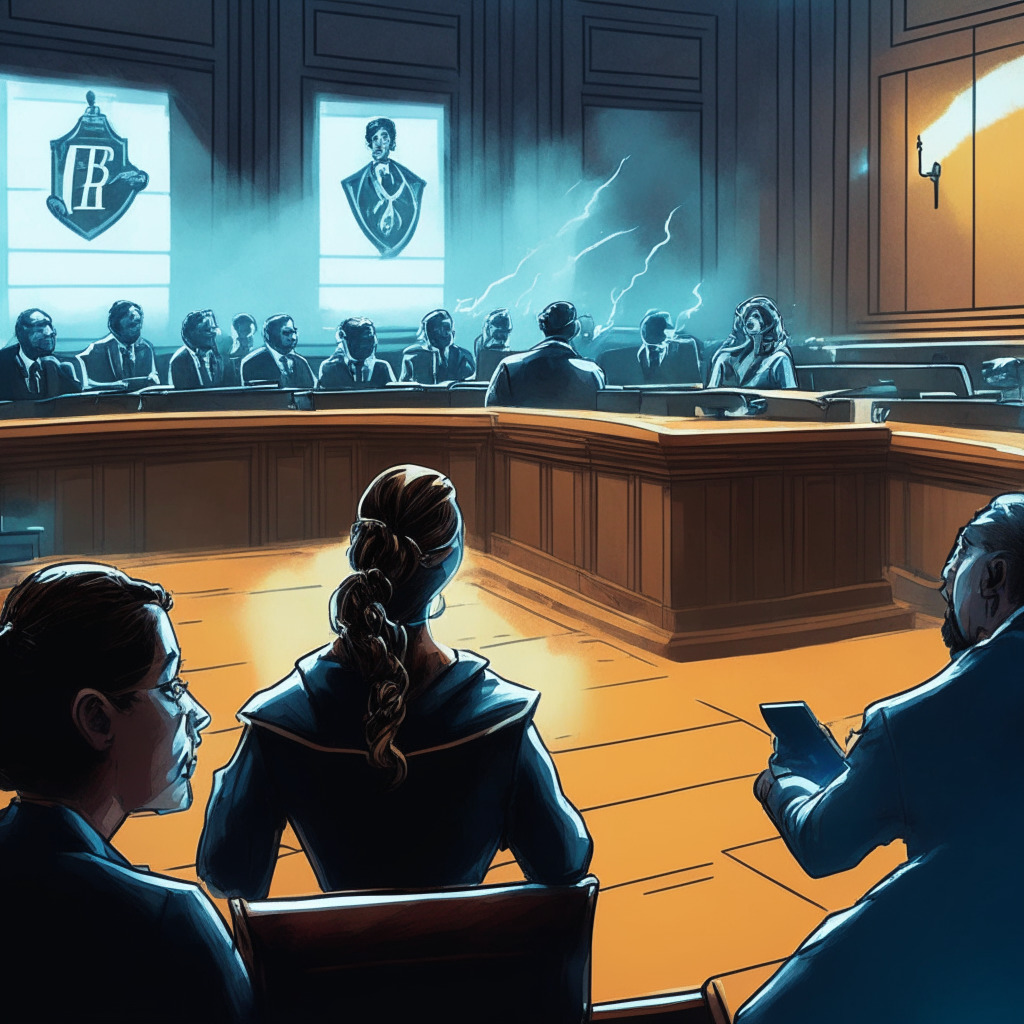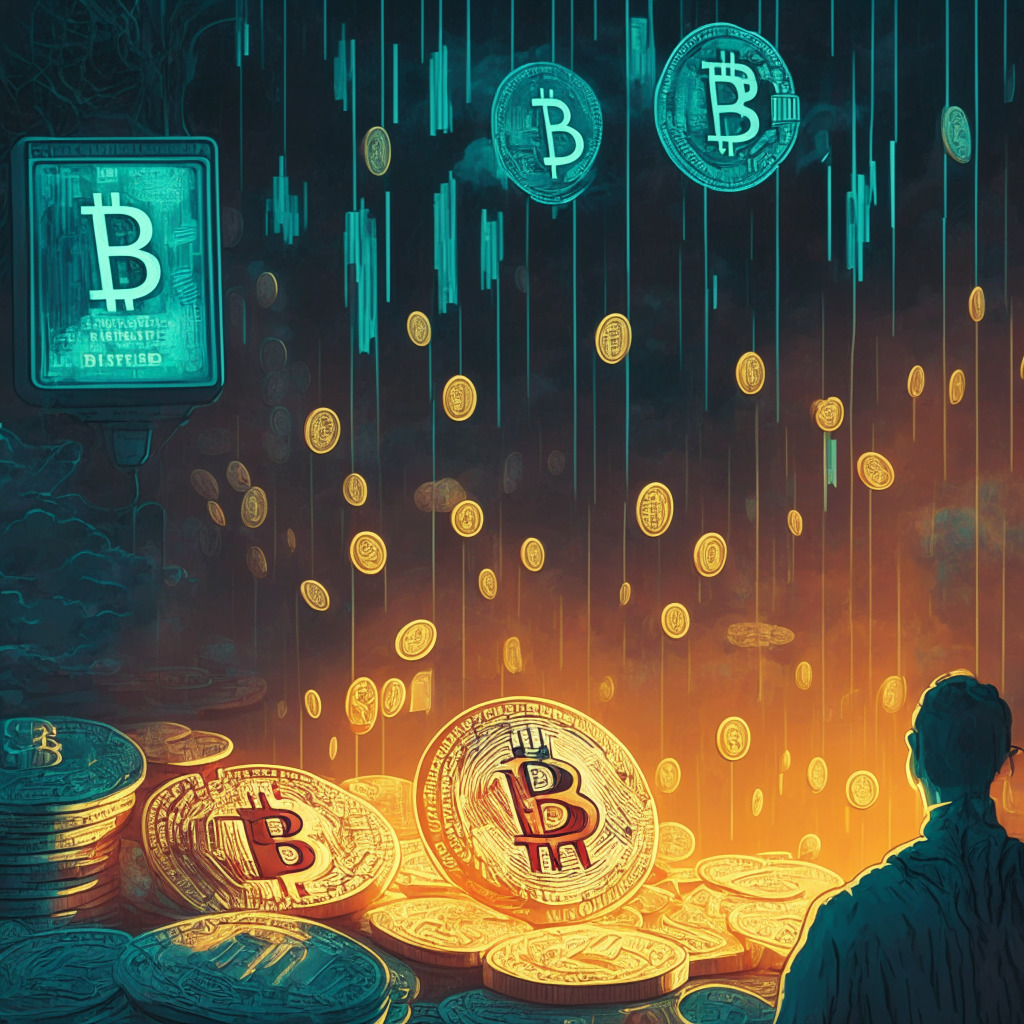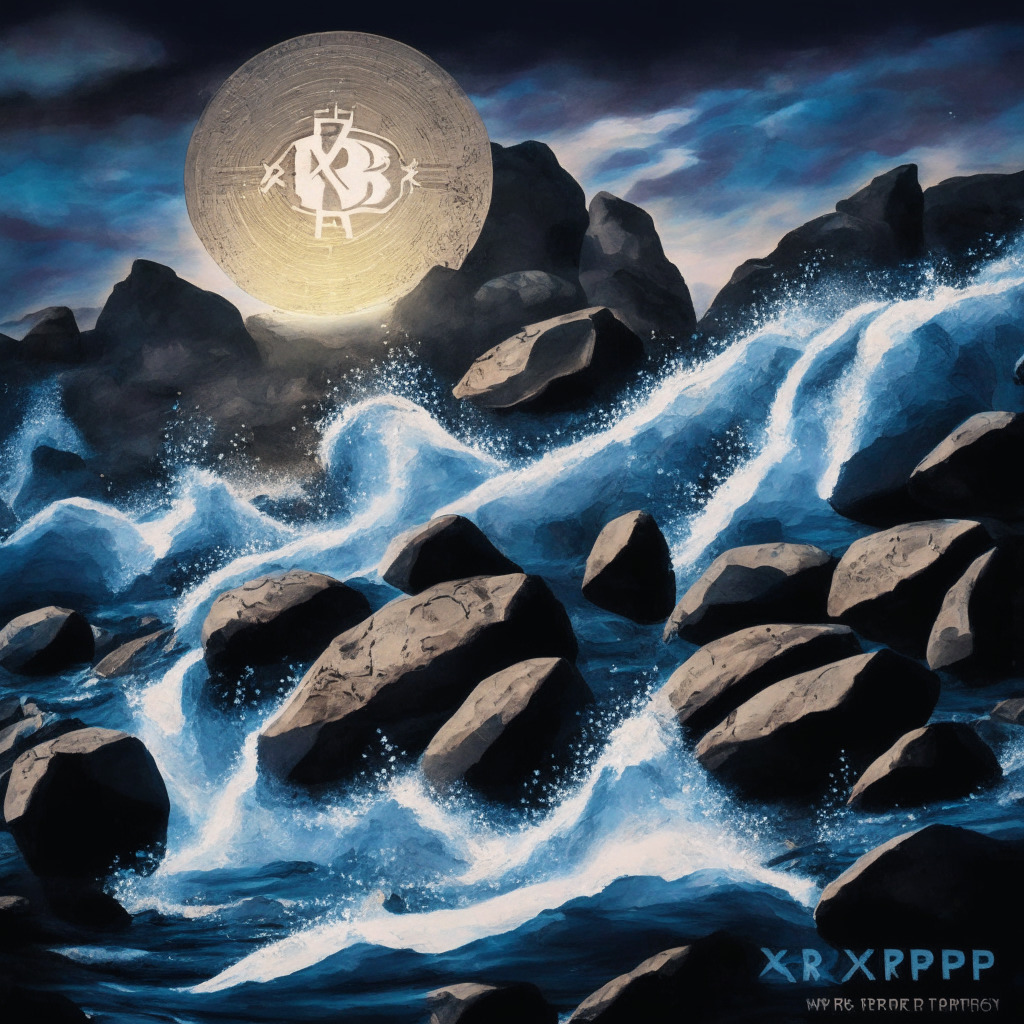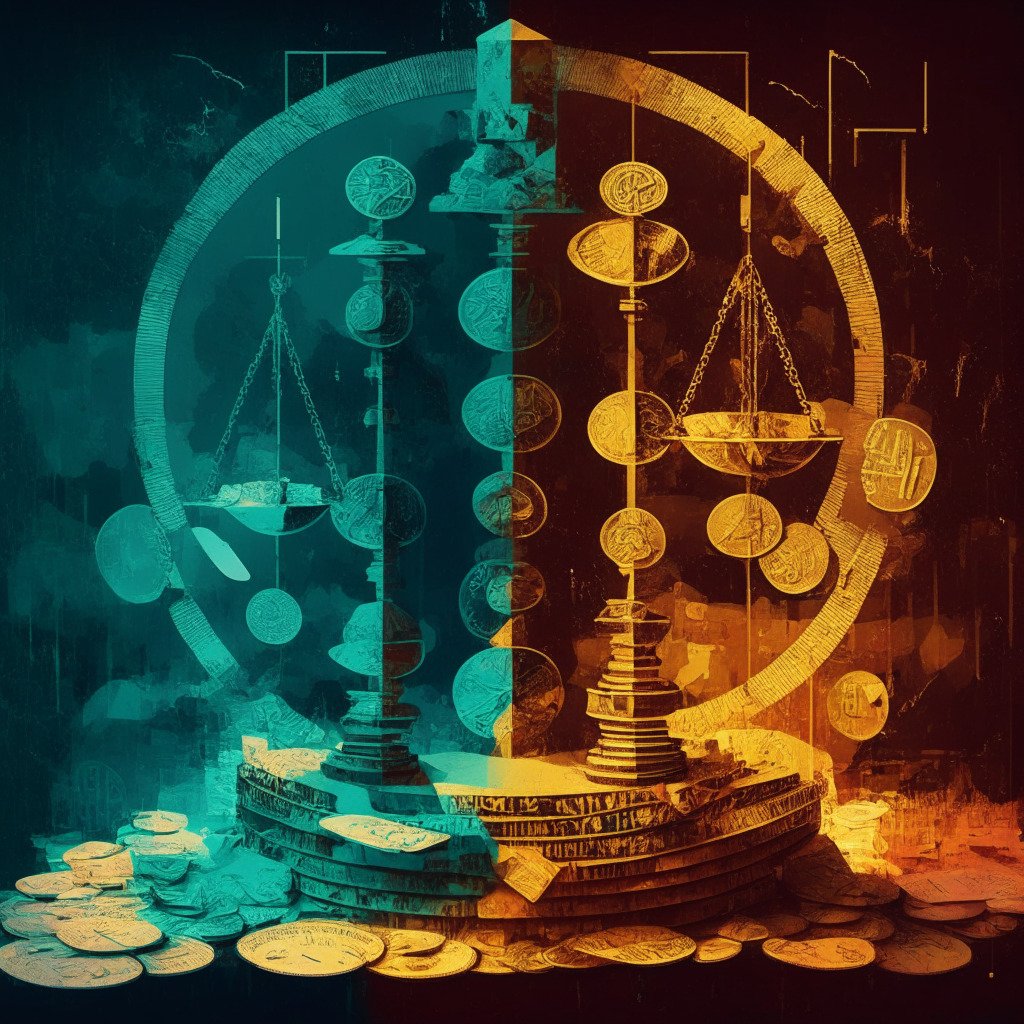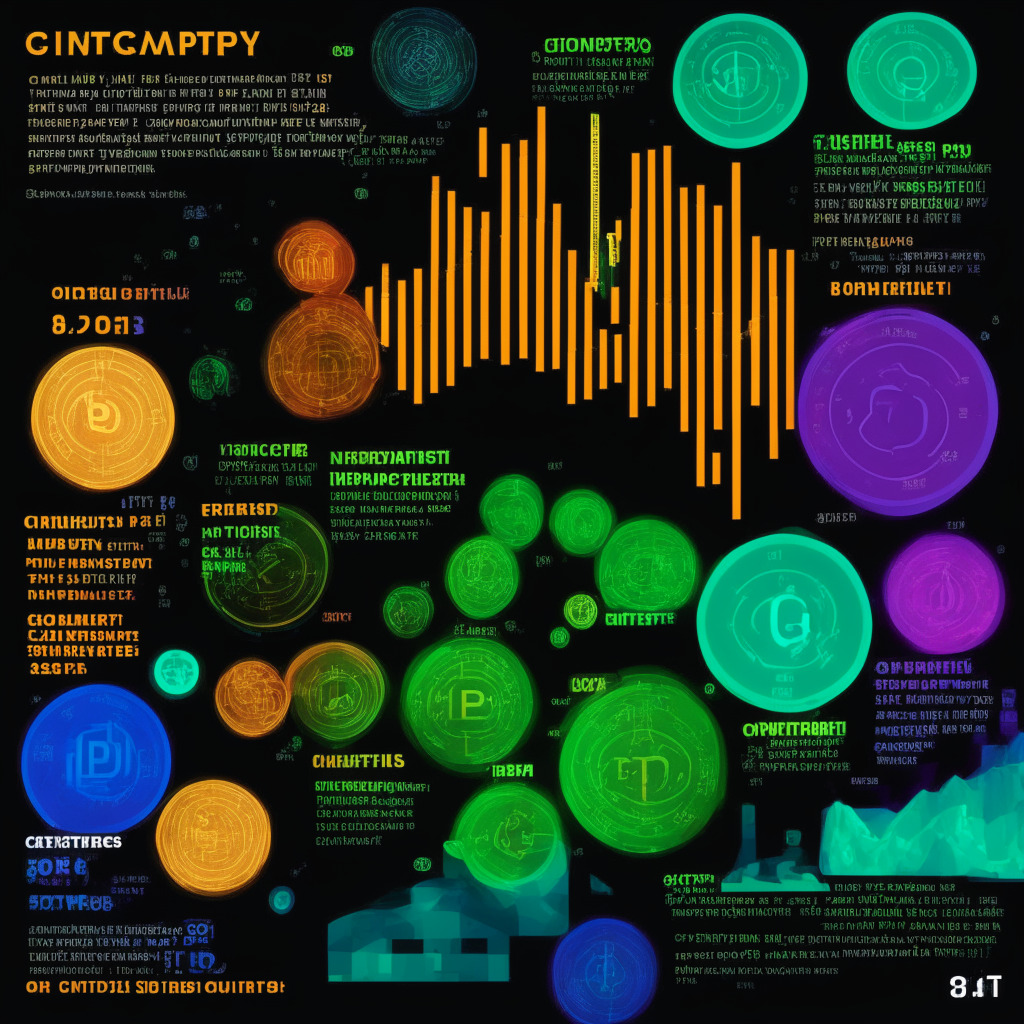The International Monetary Fund (IMF) introduced a new cross-border payment platform, offering a single ledger for central bank digital currency (CBDC) transactions, enhanced programmability, and improved information management. The XC platform aims to lower transaction fees and shorten processing times, potentially saving $45 billion in annual remittance fees. However, concerns over privacy and the need for CBDCs may impact its widespread adoption.
Search Results for: Reserve
Crypto Outflows Slow Down: BlackRock ETF Impact and Resilient Altcoins
Investors pulled $5.1 million from digital asset funds last week, marking the ninth consecutive week of outflows. The BlackRock Bitcoin ETF bid may have brought stability to the market. Grayscale dominated weekly inflows, while Ethereum-tracking products experienced outflows. Investors show a mix of optimism and caution, closely monitoring regulatory developments.
Bitcoin’s Rise Amid Dollar Decline: Pros and Cons of Market Shifts and Regulations
Bitcoin’s price experienced a 16% setback after reaching a high of $31,000, but remains up 60% YTD, driven by the dollar index decline and macroeconomic factors. Recent developments, such as BlackRock’s Bitcoin ETF application and potential altcoin regulation, create a complex debate surrounding the crypto market’s future.
Inflation Forecasts, SEC Battles, and US Dollar’s Future: Navigating Bitcoin’s Dynamic Landscape
The Bitcoin market is influenced by factors such as Goldman Sachs’ inflation forecast, ongoing SEC legal battles, and the future of the US dollar. These aspects impact Bitcoin’s price trajectory and investors should stay informed to navigate this ever-evolving landscape.
Crypto Market Reacts to Interest Rates, Fed Testimonies, and Global Economic Events
Crypto market sentiment turns cautious as BlackRock iShares Bitcoin ETF approval, Fed Chair Jerome Powell’s testimony, key central bank announcements, and inflation data releases affect Bitcoin and Ethereum prices. Investors urged to conduct thorough research in these fluctuating market conditions.
Bitcoin’s Race towards $42,000: V-Shaped Recovery vs. Bears’ Resistance Battle
BTC experienced a slight retracement to $26,278 after almost breaking the $27,000 resistance, with investors eyeing new opportunities amidst its recent dip. Developments on the Bitcoin price chart indicate a potential V-shaped recovery, targeting $42,000, although traders must watch for potential reversals and weakening support.
Imminent Ripple Lawsuit Judgement: Impact on Crypto Space and FedNow Launch Connection
The summary judgement in the Ripple lawsuit may be announced soon, amid the SEC’s preference for Ethereum and Ripple partnered banks’ participation in the US Federal Reserve’s FedNow Service launch. Investors should remain vigilant and informed, as regulatory distinctions can impact the crypto market significantly.
USDT Stablecoin: Uncovering Chinese Backing and the Quest for Transparency in Crypto
Documents from the New York Attorney General’s Office reveal Tether’s USDT stablecoin was backed by Chinese securities, contradicting previous denials. Tether held foreign securities, including Deutsche Bank and Barclays Bank, to support reserves. The findings prompt questions about USDT’s safety and legitimacy, and emphasize the importance of transparency in the crypto industry.
Emerging Exchanges Thrive Post-FTX Collapse: Lessons in Adaptability & Transparency
The Nansen report reveals a surge in trading volumes for smaller exchanges like Kraken, Bybit, and Bitget following FTX’s collapse, while established exchanges faced losses. Amid regulatory crackdowns, decentralized exchanges (DEXs) remained stable, and a shift towards greater transparency is observed within the crypto industry. Adaptability and transparency are crucial for survival and growth in the fluid blockchain landscape.
AI’s Ethical Dilemma: Balancing Abundance and Catastrophe in the Pursuit of Progress
Elon Musk emphasizes the urgent need for AI regulations to prevent catastrophic outcomes for humanity. Tech leaders call for responsible AI development prioritizing safety and accountability, while acknowledging AI’s potential for positive changes. The debate reflects broader concerns about ethics, safety, and accountability in technology.
Good Gensler Memecoin Soars: Reflection of Crypto’s Desire for Change & Regulatory Challenges
The memecoin Good Gensler (GENSLR), inspired by SEC Chair Gary Gensler, has doubled in value over the past month, outperforming the crypto market. This rally, despite recent lawsuits against Binance and Coinbase, highlights the demand for a crypto-friendly policy framework and positive change in an evolving regulatory environment.
BlackRock’s ETF Filing Resuscitates Bitcoin: Market Optimism vs Investor Caution
Bitcoin surpassed $26,000, marking its highest level in a week, following BlackRock’s recent filing for a spot bitcoin ETF. Other cryptocurrencies like Ether, SOL, ADA, MATIC, and ALGO also experienced a boost. The market’s recovery highlights the influential power of major financial institutions on the crypto market despite regulatory and inflation concerns.
Diving Into Tether’s Asset Management and Stablecoin Backing: New Insights and Unresolved Debates
The article highlights Tether’s funds distribution across multiple institutions and its reliance on commercial paper to back its stablecoin market cap. Documents from the New York Attorney General’s office offer insights into Tether’s asset storage locations, banking relationships, and asset management practices, amid ongoing concerns within the crypto community.
Tether’s Chinese Securities Exposure: Unveiling the Mystery and Its Market Impact
Newly disclosed documents reveal that Tether Holdings Ltd., issuer of the largest stablecoin USDT, previously held reserves in Chinese company-issued securities, short-term loans to Chinese companies, and a loan to crypto platform Celsius Network. Concerns arise over Tether’s $5.1 billion lending program, underpinning USDT’s importance for liquidity and stability in cryptocurrency markets.
Bitcoin Adoption in Cuba: Escaping Economic Control and Preserving Wealth
Cuban entrepreneur Erich Garcia Cruz discusses the growing Bitcoin adoption in Cuba, with citizens using it to gain independence from the state-controlled financial system. Despite challenges like currency devaluation and poor reputation, education and targeting private businesses could drive further adoption, offering an escape from Cuba’s controlled economy and wealth preservation against a devaluing national currency.
XRP’s Struggle for Stability Amid Bullish Wave and Central Bank Partnerships
XRP is experiencing a slight uptick, trading above $0.48, amid a bullish wave in the crypto market. Ripple’s CBDC Platform is being evaluated by the Central Bank of Colombia for potential efficiency, backed by the energy-efficient, open-source XRP Ledger. However, XRP price recovery is facing challenges due to resistance at key levels and the unresolved SEC lawsuit.
Bitcoin’s Rocky Road to Recovery: Blackrock’s ETF Filing and The Future of Crypto Markets
The cryptocurrency market shows signs of recovery with Bitcoin bouncing back to $25,500, driven by factors such as Blackrock’s filing for a spot Bitcoin ETF and oversold conditions. However, caution and vigilance are essential as the market navigates uncertain conditions and ongoing regulatory disputes.
CoinEx Settlement with NY Attorney General: Understanding the Impact on Crypto Exchanges and Investors
Hong Kong-based crypto exchange CoinEx faced a $1.7 million settlement with the New York Attorney General’s office due to failure to register as a securities and commodities broker-dealer. The settlement acts as a cautionary tale for crypto companies that don’t comply with New York laws, emphasizing the risks unregistered platforms pose to investors and the economy.
Crypto Turbulence Amid Fed Policies and Tether Troubles: Navigating Market Uncertainty
Crypto investors face turbulent market conditions as Bitcoin and major altcoins struggle to recover. Falling liquidity and regulatory concerns add to market jitters, while equities gain momentum. Investors should tread carefully and adopt a long-term strategy during these uncertain times.
MakerDAO’s DAI Rate Hike & Shift to Real-World Assets: Implications for Stablecoins
MakerDAO approved a DAI Savings Rate increase from 1% to 3.49% and rearranged DAI stablecoin’s backing assets. By investing in real-world assets like short-term U.S. government bonds, Maker aims to bridge cryptocurrency with real-world assets, impacting other stablecoins’ market standing like USDP and GUSD.
Skipping Interest Rate Hike: Economic Savior or Catastrophe? Crypto’s Role in Financial Turmoil
Federal Reserve Chairman Jerome Powell opts to “skip” a round of rising interest rates amid mixed reactions. As inflation reaches a 40-year high and citizens report higher living costs, some analysts believe the decision might do more harm than good. This scenario also highlights the varying roles and adoption of cryptocurrencies across different countries.
Depegging Dilemma: Tether’s Turbulent Times Amid Loan Saga and NYAG Revelations
The depegging of stablecoin Tether (USDT) is linked to the loan saga on DeFi platform Curve. Tether Holdings Ltd reveals concerns over sensitive commercial information shared by the Office of the New York Attorney General to Coindesk. The crypto community now fears potential implications from the released documents.
Fed’s Hawkish Stance Shakes Crypto Market: Analyzing BTC, ETH, WSM, and AI Amid Uncertainty
Crypto prices face sell pressure due to the US Federal Reserve’s hawkish interest rate outlook, impacting Bitcoin and Ether. Despite setbacks and regulatory uncertainty, projects like Wall Street Memes, yPredict, and AiDoge show promise and gain traction, offering opportunities for investors.
Unearthing Dormant Bitcoin Whales: Motivations and Long-term HODLing Success
A Bitcoin whale recently transferred 50 BTC, worth over $1.2 million, that had remained untouched for more than 13 years, stirring curiosity around long dormancy and sudden asset shifts. Long-term “HODLers” have proven to be the most successful investors, with Bitcoin’s value consistently increasing despite volatility.
Unraveling the Massive XRP Account Deletion: Impact on XRPL and Crypto Investors
The XRP Ledger experienced a significant spike in account deletions, primarily attributed to Poloniex deleting around 15,000 old XRP accounts, recovering 275,000 XRP tokens, and prompting a substantial token burn in fees. The account deletion and token burning could optimize exchange operations and maintain compliance, but may also impact XRPL users and XRP’s market value.
Inflation, Depreciation, and the Rise of Digital Gold: How Tether Leads the Way
This article discusses the increasing appeal of gold and digital gold, such as Bitcoin, as inflation rises and currencies depreciate. Tether Gold aims to capitalize on this trend, potentially playing a pivotal role in decentralized finance while ensuring security measures and overcoming regulatory hurdles.
HODLing on the Rise: Bitcoin Dominance Grows as Market Takes Volatile Turn
The cryptocurrency market is experiencing increased HODLing and a shift of capital from altcoins to major cryptocurrencies like Bitcoin. Recent data indicates a growing preference for Bitcoin, with its dominance rising to 47.6%. Despite this, investors should remain cautious and vigilant, as market conditions can change rapidly.
ECB Rate Hike Impact on Crypto Market: Managing Inflation vs Stifling Growth
The European Central Bank (ECB) raises interest rates amid crypto market slump, boosting Bitcoin price. Inflation concerns persist, affecting the future of cryptocurrencies in a fluctuating economic landscape. Investors must conduct thorough market research before making financial decisions in the volatile crypto world.
Crypto Market Volatility: Impact of Fed Policy, CBDCs, and Exchange Crackdowns
Cryptocurrencies experienced significant declines, with Bitcoin dropping below $25,000 and altcoins like MATIC and ADA falling up to 9%. This comes after the Federal Reserve’s policy decision to suspend rate hikes, yet signaled further monetary tightening. Meanwhile, the European Commission plans to propose a draft law affecting digital euro operations, and Binance Smart Chain faces challenges as total value locked drops to its lowest since March 2021. These events reflect the crypto space’s volatility and uncertainty, with ongoing debates on CBDCs, regulatory actions, and global economic influences impacting its future.
Cryptocurrency Crash: Fed Decision Impact, Market Volatility, and Future Growth Prospects
The global cryptocurrency market recently experienced a 4% crash, with the cumulative digital asset market cap dropping to around $1.02 trillion. This coincided with the Federal Reserve’s decision to pause rate hikes, resulting in over 46,000 traders being liquidated and a total liquidation value of approximately $162.2 million.
Crypto Markets Dive as Fed Signals Interest Rate Hikes: A Temporary Downturn or Future Reality?
The crypto market experiences turbulence following regulatory actions and Federal Reserve’s uncertainty on interest rate hikes, with Cardano losing 22% in value in a week. This downturn raises debates on cryptocurrency investments as traditional financial instruments offer higher yields.
User Protection Funds: A Shield for Crypto Exchanges or a False Sense of Security?
A Nansen report reveals reputable exchanges, such as Binance, OKX, and Bitget, collectively hold over $2 billion in user protection funds. Despite being a positive indicator, these funds don’t guarantee solvency. The uncertain US regulatory environment also poses a potential threat to these exchanges’ growth.






